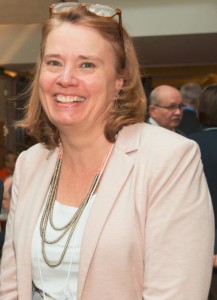Ruth Ivory-Moore, Program Director Environment and Energy, traveled to COP22 in Marrakech, Morocco in November as world leaders meet to discuss implementation of the Paris Agreement that went into effect on November 4, 2016. The first week she is supporting ACT Alliance of which ELCA is a member by participating in Side Events that allow for everyone to be directly engaged in discussions addressing the diverse issues surrounding climate change. The second week she is serving as part of an ACT Alliance delegation as an observer. Below are some reflections and photos of her first week of experiences at this amazing conference where people project to be on one accord to protect and steward all of creation.
In This Together
11/15/2016
“If you want to go quickly, go alone. If you want to go far, go together.” – African Proverb.
This proverb is particularly instructive in describing the events at COP22. There is a strong sense of diversity and inclusiveness. Senior level governmental officials negotiate Paris Agreement implementation provisions; civil society observes and seeks to influence; and those most likely to be impacted now and in the future, sought to be heard. The latter included indigenous people and our children. These voices were heard in various ways during this session of COP22.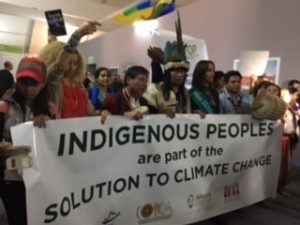
The indigenous people have contributed least to climate change, but are significantly impacted. They need the rest of the world’s assistance, but those providing the help must first understand their community dynamics. Those offering assistance must do so in an accompaniment manner. We must walk and stand with them in partnership – bridging gaps, while laying the foundation for sustainability and resilience. A diverse group of people including the indigenous staged a march to express the need to hear their voices; and to recognize that they must be included in the conversations. (See picture left)
While the indigenous people are likely to be impacted as part of the world’s vulnerable population today, we should not forget that we must leave a vibrant, clean world for our children. 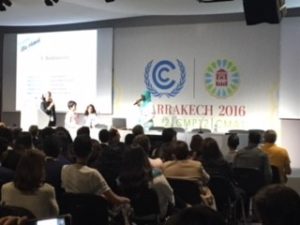
The COP presented opportunities for some amazing young people to show the world that they have voices, and deserve better than what we are on course to leave them today. Whether it was the young girl from Senegal speaking about biodiversity. (See picture left)
The students quizzing a panel of experts with questions that challenged the brightest. (See picture left)
Or those students capturing the moments as camera and production personnel for the hour and half, each presented themselves not only professionally, but passionately and 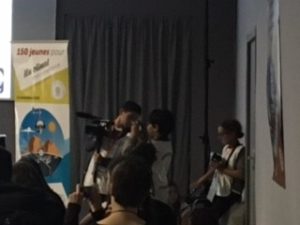 credibly. (See picture left)
credibly. (See picture left)
This COP22 cleverly demonstrated the importance of all and the need for complete inclusiveness. This all-inclusiveness extends to religion.
Sessions incorporated diverse religious personnel. An Islamic cleric spoke of the importance of ecology, emphasizing that the Islam mandates that people must protect all. The universe is to show gratitude to God, who is beauty. God loves beauty, not war. A Buddhist leader spoke of how all life is interdependent and that we were born on this earth not to be part of the destruction. COP demonstrates that caring for 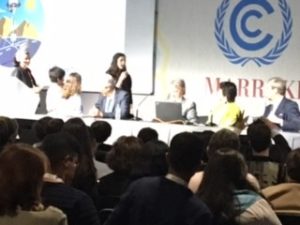 creation is a stewardship requirement that is shared by the faith-based community in general.
creation is a stewardship requirement that is shared by the faith-based community in general.
We are commanded by God; and have a duty to our children.
Prayer: Oh God of Heaven and Earth, you desire a reconciliation of the whole creation. We confess that we too often make choices that separate and destroy. Forgive us our selfish ways. Help us to seek justice, oh God, and to walk humbly beside you as we seek life that is centered on you and as we protect your creation. Help and guide us to joyfully seek your wisdom and guidance. Amen.
(Prayer adopted from Creation Justice Ministries, https://salsa4.salsalabs.com/o/50750/images/Gods%20World-1.pdf?key=85797681.)
——
Gender and Equity
11/10/16
“There is no longer Jew or Greek, there is no longer slave or free, there is no longer male and female; for all of you are one in Christ Jesus.” (Galatians 3:28, NRSV)
It is unfortunate that being “one in Christ” is not recognized universally in the world as we live our lives today. The Asian-Pacific Resource and Research Centre for Women (ARROW) a Malaysian based organization sponsored an interactive discussion session at COP22 entitled “Paris Agreement and Women – Locating Health in Climate Change Discourse”. The reality is that women are disparately impacted by the effects of climate change. The time has come to acknowledge and integrate the gender rights issue into the discussions addressing climate change.
The Paris Agreement in the preamble states: “ Acknowledging that climate change is a common concern of humankind, Parties should, when taking action to address climate change, respect, promote and consider their respective obligations on human rights, the right to health, the rights of indigenous peoples local communities, migrants, children, persons with disabilities and people in vulnerable situations and the right to development, as well as gender equality, empowerment of women and intergenerational equity…” At the COP22 where the representatives from the many nations are beginning to hammer out the implementation rules and guidelines of the Paris Agreement, the hope is that key linkages between women’s health and climate change will be considered and incorporated in the implementation discussions.
ARROW has captured the stories of women on post cards. Here are the stories of two of them.
Supl’s story is:
Gladys’ story is: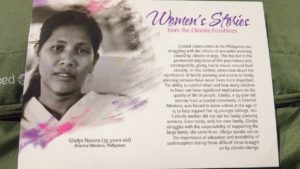
These women’s stories are unfortunately not atypical particularly in developing countries. ARROW representatives gave the example of Bangladesh which is a densely populated country with a poverty level that is very high. Bangladesh is experiencing more severe weather in the form of increased frequency of floods and cyclones where women are impacted the most. The women do not want to leave their homes for fear of property losses, but are often forced to leave and migrate internally walking through high flood waters that results in gynecological illnesses that can impact the reproductive system. These women can also be the targets of sexual violence. Living through situations such as these can cause depression which impacts mental health.
This ARROW presentation at COP22 was unique in that the end of the session was all about hearing what the audience had to say. The session facilitators engaged the audience in a robust conversation. Questions raised included: (1) How will women’s health issues be incorporated in the Paris Agreement implementation; and (2) What can be done to make this happen? The consensus of the group was that the time has come where gender issues needed to be integrated into the talks and be given the same weight/status as other issues.
Women in a marginalized society, are the most vulnerable among us.
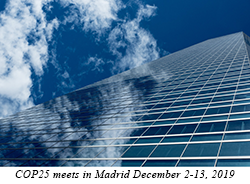 This moment in time involves using all tools at our disposal with a recognition that our human existence is interlinked with all of creation. “Lutherans are called to listen to the cry of the Earth along with the anguished cry of every broken soul so that we assume personal, ecclesial and public leadership in addressing both human justice and Earth justice together,” reads “Why Lutherans Care for Creation.” We are equipped at COP25 to use God’s creative wisdom to take stock of where we are now and where we need to be and to devise plans to wisely steward our place caring for the earth.
This moment in time involves using all tools at our disposal with a recognition that our human existence is interlinked with all of creation. “Lutherans are called to listen to the cry of the Earth along with the anguished cry of every broken soul so that we assume personal, ecclesial and public leadership in addressing both human justice and Earth justice together,” reads “Why Lutherans Care for Creation.” We are equipped at COP25 to use God’s creative wisdom to take stock of where we are now and where we need to be and to devise plans to wisely steward our place caring for the earth.






